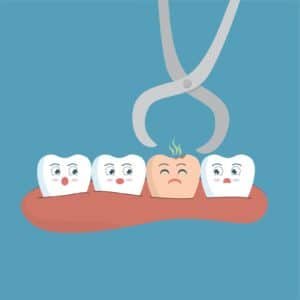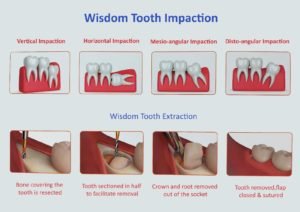Oral and maxillofacial surgeons focus on treating problems related to the hard and soft tissues of the face, mouth, and jaws (the upper jaw is referred to as the maxilla).
Oral and Maxillofacial Surgery
What is Oral and Maxillofacial Surgery?

A simple extraction is performed on a tooth that can be seen in the mouth. In a simple extraction, the dentist loosens the tooth with an instrument called an elevator. Then the dentist uses an instrument called a forceps to remove the tooth.

A surgical extraction (Wisdom tooth) is a more complex procedure. It is used if a tooth may have broken off at the gum line or has not come into the mouth yet. Surgical extractions commonly are done by oral surgeons. The doctor makes a small incision (cut) into your gum. Sometimes it’s necessary to remove some of the bone around the tooth or to cut the tooth in half in order to extract it.

After any type of tooth extraction, be sure to follow your dental professional’s instructions for oral care, including the following tips:
-
- Eat Soft Foods: Stick primarily to liquids until any anesthesia wears off, and then limit your diet to soft foods for the first few days after tooth extraction.
- Take care of your teeth: Don’t brush the teeth immediately next to the area of tooth extraction on the first day after the procedure, but do brush the rest of your teeth. Two days after a tooth extraction, get back to a good oral care routine.
A dental cyst develops very slowly without causing any pain or giving other symptoms. It is only noticed when it becomes large or when it is contaminated and causes inflammation and pain. Surgery may be used to help with removing a cyst. A surgical procedure will work by opening the area around the gums where the cyst is found. This is used to remove cysts that are too deep into the jaw area and cannot be easily reached through endodontic therapy.
The treatment of a fracture may include surgery. Treatment may also include wiring the mouth closed to stabilize the jaw joints as the bones heal. Healing of a broken jaw that requires wires, metal braces or screws may take up to four to six weeks to heal. Following the removal of the wires, the doctor measures the stability of the jaw, and physical therapy is often scheduled to rebuild the strength of the jaw muscles and joints.
Anti-inflammatory medications may decrease discomfort and aid in healing during treatment. You may also be prescribed an antibiotic to prevent an infection of the bone. A strict, liquid-only diet is typical because you can’t chew food with the wires in place.
Corrective Jaw Surgery sometimes needed when orthodontics is not enough to correct a misaligned bite. In other cases, surgical treatment is necessary to repair congenital abnormalities (birth defects) or to treat severe orthodontic conditions, skeletal problems, and other disorders. In this procedure, usually performed under general anesthesia, the bones of the face and jaw may be reshaped and repositioned, and the jaws and teeth realigned. Oral surgeons often work closely with orthodontists in planning and carrying out this type of surgery, which may be needed when orthodontics alone can’t correct the problem.
Cleft lip /palate surgery a special type of surgery often performed by oral and maxillofacial surgeons to correct the changes in facial structure caused by this birth defect.
Frequently Asked Questions
When Should I Have My Wisdom Teeth Removed?
Although the best time for removal of wisdom teeth is about 16 years old, there is a wide age range for patients who require wisdom teeth removal.
Should wisdom teeth be removed even if they are not causing any problems?
Wisdom teeth, sometimes referred to as third molars, can cause serious problems such as crowding and shifting other teeth, changing your bite, and contributing to the loss of jawbone tissue. Wisdom teeth that are only partially erupted often trap food, causing decay and gum disease. Swelling and jaw pain are some of the most common early symptoms. The longer your wisdom teeth remain in your mouth, the more likely they are to cause harm, and the more difficult they are to remove. Because wisdom teeth erupt at different rates, a lot of damage can be done before you even begin to notice symptoms.
How long should I keep pressure on the gauze?
Bite down with firm pressure during that time. Then gently remove the gauze. If bright red blood flows from the Surgery area, put a clean piece of moistened gauze in your mouth and again bite down with firm pressure for another 30 minutes. After that, bleeding should have eased. A pink tinge to your saliva is normal and may continue for a day or two.
What should I do if I still notice blood on the gauze?
Keep pressure on the gauze. Do not talk or spit. Remain at rest during this time.
What can I do to relieve pain?
Begin taking prescribed pain medication as soon as possible after surgery. We recommend that you first eat something to alleviate nausea that pain medication can cause. Continue taking the medication on the prescribed schedule for the first day or two. After that time, take pain medication as needed in accordance with prescribed directions.
How long will my recovery take? When can I return to work or to my normal routine?
You have undergone significant surgery and your body needs time to recover. Plan at least three or four days to rest from normal activity. How quickly you recover depends on how you cooperate with your body’s healing process (resting, drinking liquids, taking your medications, avoiding hard foods and vigorous chewing, rinsing gently, etc.). By following these guidelines, you will minimize complications such as infection and the breakdown of the blood clot (“dry socket”) and return to your routine more quickly.
My lip (and / or tongue) feels numb. What does this mean?
Numbness of the lip, tongue, gums, teeth etc. is a common occurrence after lower jaw surgery. It is usually caused by some type of irritation to the nerves involved and over 90% of the time resolves within a few days or weeks. Occasionally, it may take longer to resolve. Fortunately, it is just a feeling sensation and does not cause a muscle weakness.
How long do the holes in my jaw stay after extractions?
The “holes” or better, extraction sockets will generally close within 6 weeks. It will take several months for the sockets to actually fill with bone.
I have terrible bad breath after the surgery. Does this mean I have an infection?
No. The bad breath may be caused by food getting into the socket area. Be sure to keep the surgery site clean and this should resolve.

